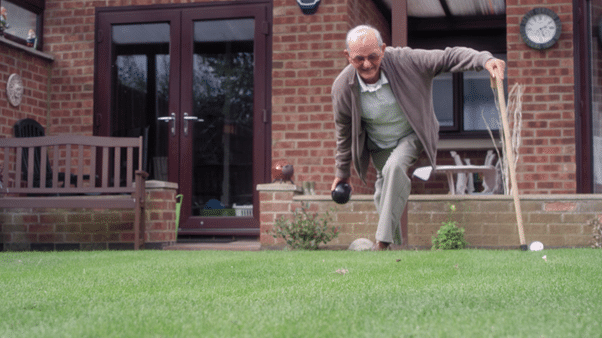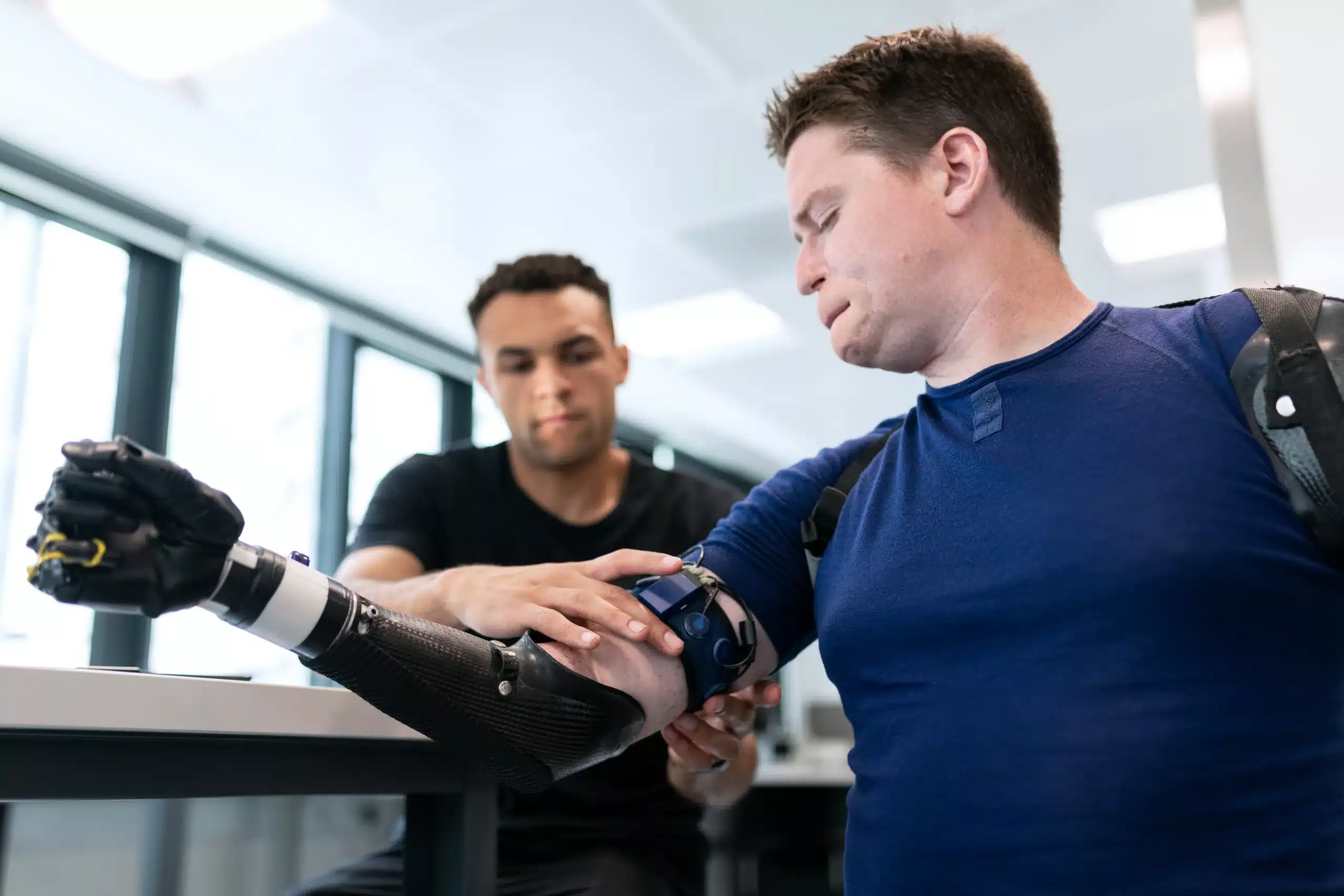
 " alt="">
" alt="">
Amputation Claims

Reviewed by
Peter Rigby - Director of Medical Negligence
We've got your Amputation Claim covered
- No win No fee
- Not just lawyers - real specialists
- No obligation
- UK's highest-rated medical negligence solicitors
Amputation Claims
There are 5000 people in need of a lower limb amputation every year in the UK. Most of these will be from accidents or injuries, such as road traffic accidents or injuries at work. There are, however, some people who have to undergo an amputation due to medical negligence, where there has been a breach of care leading to an avoidable amputation. If this has happened to you then our expert solicitors can help.
Making an Amputation Claim
An amputation can have a serious impact on your life, your loved ones and your independence. Although compensation can’t erase a life-changing injury, it can be the beginning to getting you and your family the support that you deserve.
Our experienced specialist medical negligence team is here to guide and support you on the journey to claiming compensation and will help you to understand:
- If you have a claim for amputation negligence
- How and why your treatment resulted in an amputation
- The evidence you will need to support your claim
- How much compensation you get for losing a limb and/or a finger
Find out if you
have a claim
Take the 10-second claim test
Free Advice
03300 080 352
claim form
We're the highest-rated No Win No Fee medical negligence solicitors on Trustpilot
What is an Amputation Claim?
Medical professionals have a duty of care, if that duty of care was breached and an amputation occurred as a direct result of that breach, this is medical negligence and you are able to make an amputation claim. An amputation claim is a claim for medical negligence after an amputation that did not need to happen. If your amputation injury could have been avoided with improved medical care and correct diagnosis, you can contact us and find out if you have a claim for compensation.
Types of Amputation Claims
Every amputation claim will be different. Typically, amputations are divided into upper and lower limb amputation types.
Upper limb amputation: this refers to any limb or area on the upper part of your body, ie, your arms, hands or fingers. There are several types of upper limb amputation according to the amputation site. For example, a shoulder disarticulation removes the arm above the shoulder, whereas a partial hand amputation means you would still have use of your wrist. The degree of amputation may be taken into account when calculating your compensation claim.
Lower limb amputation: this is the amputation of your legs, feet or toes and, again, includes different types of amputation depending on where the limbs were amputated. It can be as far up as the hip or be a digit amputation where toes have been removed. The severity of the injury is relevant in determining the impact on your life and that of your loved ones.
Any amputation can be catastrophic and devastating. Which is why we assess every detail and pursue the maximum amount for your injury.
Diabetes and Amputation
Diabetes accounts for more lower limb amputations in the UK than any other cause. This is mainly due to diabetic foot ulcers and foot infections. Foot ulcers are a common side effect of diabetes and patients should be well-informed about foot care, and have examinations where necessary. Any failure to examine the feet correctly, which leads to amputation could be considered medical negligence. You may also have experienced a diabetes misdiagnosis. Our friendly and understanding solicitors can help you understand if you have a claim and how you can proceed.
How Do I Know If I Can Make a Claim?
It costs nothing to find out if you have a claim for amputation negligence. Our lawyers were able to secure compensation for an 82 year old patient who had a leg amputated after a delayed diagnosis of gangrene. This is one example and there are many circumstances we come across where an amputation could have been avoided. The most common cases we see include:
- Surgical errors, such as damage to a major artery where blood flow was unable to be restored
- Misdiagnosis of diabetes leading to a loss of circulation and, consequently, the loss of a limb
- Misdiagnosis of cancer where the cancer has spread to other body parts which have had to then be amputated to remove the cancer
- Delayed diagnosis of other conditions and illnesses such as vascular disease and meningitis
- Untreated or mistreated infections such as sepsis
- Incorrect fracture treatment leading to tissue damage
- Poor aftercare after a surgical procedure
This list is not exhaustive and amputation can happen for many reasons. Which is why the best way to find out if you can make a claim is to contact specialist medical negligence lawyers who understand your case and can help with your claim.
What Can I Expect When Making a Diabetes Claim?
Though no amount of compensation can excuse or change a life-altering event such as the loss of a limb, there are ways that settlements can support you and your family. Successful amputation claims can help you to make each day a little bit easier and you can usually expect to receive compensation to pay for:
- Ongoing treatment, care and rehabilitation
- Advanced prosthetic limbs
- Resources to adapt your home as necessary to prioritise your safety and comfort
- Loss of earnings
- Counselling
Our client was awarded £450,000 after medical negligence led to the amputation of her foot. Although final figures will always vary according to the individual circumstances, it is important to secure compensation for the mental, physical and economic impact suffered.
Why Choose Patient Claim Line for Your Amputation Claim?
We have more than 100 solicitors based all over the UK. They are a team of medical lawyers specialising solely in medical negligence and misdiagnosis claims. We understand every aspect of medical negligence and have taken on thousands of cases just like yours.
When processing your legal claim, your solicitor will be on hand throughout the journey. We have strong relationships with professionals across all key touch points; empowering you to rebuild your independence through ongoing rehabilitation support, home adaptations, emotional support and counselling.
We also have a Family Support Hub full of resources and advice to help you and your family if you have been impacted by medical negligence.
No Win No Fee Amputation Claims
From the very beginning, when you make an initial call, you pay absolutely nothing to us until your case is settled. There are no upfront fees, your initial consultation is completely free with no obligation and, if we are able to proceed with your case, we do so on a no win, no fee basis. Tackling the enormous changes to your life after amputation is a difficult and long road. Our no win no fee promise exists to make your compensation claim as stress free and simple as possible so you can start looking to the future.
Why Choose Patient Claim Line for your Amputation Claim?
Not just lawyers — medical negligence experts
Patient Claim Line was established in 2014 and consists of a team of medical lawyers specialising in cancer negligence and general medical negligence claims.
At Patient Claim Line we have more than 100 solicitors with a combined experience of over 400 years and they will work on your behalf to achieve the best result possible for you.
It’s not enough to use a solicitor who sometimes covers medical negligence. You need someone who knows this area through and through. That is what the solicitors here at Patient Claim Line do. They deal exclusively in this area of law and are experts in the field.
Frequently asked questions about Amputation Claims
Our expert legal team answer your questions about making an Amputation Claim
There are set time limits when making any medical negligence claim. This is usually three years from the date of injury or the date of discovery. There are exceptions to this. Children came claim up to three years after their 18th birthday, regardless of what age they were when the injury occured. In cases where a patient does not have the mental capacity to pursue a claim themselves, the time limit may be indefinite. A specialist medical negligence solicitor will be able to help you understand if these exceptions apply to your amputation claim.
To make a claim for amputation compensation, you should contact a specialist medical negligence solicitor who has many years of experience in amputation injury and medical negligence claims. A solicitor will take care of the entire process for you, asking for relevant and important information when necessary.
Compensation for the loss of a limb can reach hundreds of thousands of pounds. The final sum will be different for every amputation case and will be calculated on individual circumstances. Amputation is divided into two categories, major amputation and minor amputation. The category your amputation falls into could affect the amount of compensation you receive.
When you make a claim for any kind of medical negligence, your lawyer will be able to access all of the relevant medical records and information. What you may need to provide is any receipts regarding any financial losses you have suffered because of the negligence, and any evidence of the impact on future earnings. You will have plenty of time to gather this information and it will be explained step by step as your case moves forward.
If you have had an avoidable amputation as a result of medical negligence, you may be offered a prosthetic limb from your healthcare provider. However, you may wish to source a more advanced prosthetic limb that will help you carry out tasks with greater ease and independence. This is one of the considerations taken into account when making a claim for amputation compensation.
Meet our Amputation Claims Team
Case Study
Gordon's Story
"It was an experience that I never thought I’d have to go through"
Gordon first reported a blockage in 2011, but this wasn’t fully investigated. This delay in medical care meant that he needed an amputation of his lower leg, which impacted his mobility and independence.
The team at Patient Claim Line determined that Gordon lost his leg because medical professionals didn’t operate soon enough. Our team fought to ensure Gordon received justice, and they were able to secure him compensation for his suffering.


The financial settlement enabled him to purchase a more suitable prosthetic leg, as he found the NHS prosthesis uncomfortable. Gordon now finds playing his beloved bowls much easier, and his team were recently promoted to a higher league.




